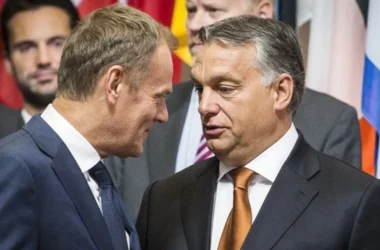JD Vance’s speech will undoubtedly be remembered in modern political history
The Munich Security Conference concluded on February 16, with discussions on ending the war in Ukraine among the key topics. During his final speech, Chairman Christoph Heusgen became emotional and broke down in tears. However, one of the most talked-about moments was U.S. Vice President JD Vance’s speech, which will undoubtedly be remembered in modern political history. He stated that he does not see Russia and China as threats but instead emphasized internal dangers within Europe. Criticizing the EU’s migration policies, he accused European leaders of censorship and questioned the strength of European democracy.
Regardless of whether his speech is viewed positively or negatively, its significance is undeniable—it largely depends on the perspective of the audience. Vance did something unprecedented: he shifted the strategic focus and made it clear that the war in Ukraine is Europe’s problem. Experts have already called his speech “an apology for conservative values,” aligning with the political direction of the new Trump era. Supporting this notion is Vance’s meeting with the AfD leader, signaling a clear stance on traditional values and outlining potential allies for the future.
Vance’s Speech Was Neither a Sensation Nor a Surprise
The emergency summit of European leaders in response to Vance’s speech is a predictable reaction to the U.S. position. However, the use of the word “emergency” is somewhat ironic, given that Trump and his circle have long made their stance on Ukraine clear. Despite the media hype surrounding it, Vance’s speech was neither shocking nor unexpected. The strong reaction may stem from the fact that European leaders have become unaccustomed to blunt rhetoric. Their calls for “extraordinary efforts” to address the situation are expected, but whether they will lead to concrete action remains uncertain.
Trump has made it clear that he intends to end the war in Ukraine. Notably, according to polls, 44% of Ukrainians hope he will succeed—an exceptionally high figure that reflects a significant level of trust. This is especially important ahead of anticipated meetings between American and Russian negotiators in neutral locations. Ukrainian diplomats’ biggest fear has materialized: the world now sees that Ukraine is not only excluded from the negotiations but is also uninformed about what is being discussed by U.S. and Russian representatives.
Dmitriev’s Appointment Signals a Serious Step in Negotiations
Another major topic at the conference was the appointment of Russia’s new chief negotiator, Kirill Dmitriev. Born in Kyiv and a former Ukrainian citizen, he also spent several years in the United States. Ukrainian diplomats have labeled him “an unsympathetic, impudent Russian.” However, setting aside these characterizations, Dmitriev’s deep integration into Russian and American business circles suggests that he also maintains key contacts in Ukraine. This makes him less of an “impudent Russian” and more of a highly capable negotiator with valuable connections.
Dmitriev’s appointment is significant, as it indicates Russia’s readiness to engage in serious talks, particularly with Trump’s administration. Putin, aware that Trump’s team in Washington is undergoing major changes, is prioritizing highly skilled diplomats who can swiftly adapt to shifting political dynamics. Meanwhile, Ukraine has lost significant influence on the international stage. Its best chance to secure a meaningful place at the negotiating table lies in urgently revitalizing its diplomatic corps by appointing experienced, well-connected professionals.




